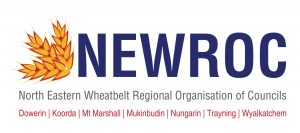BANK CLOSURES IN REGIONAL AUSTRALIA
On behalf of the North Eastern Wheatbelt Regional Organisation of Councils (NEWROC) and their communities, we would like to thank the Senate Standing Committee on Rural and Regional Affairs and Transport for providing an opportunity to submit to the “Inquiry into Bank Closures in Regional Australia”.
The North Eastern Wheatbelt Regional Organisation of Councils in WA includes the Shires of Nungarin, Trayning, Mukinbudin, Wyalkatchem, Mt Marshall, Koorda and Dowerin. There are 9 townships within these Shires.
a. the branch closure process, including the reasons given for closures;
From NEWROC’s perspective the process bank’s take when closing a branch in a rural community is often made in Head Office (eastern states), there is no consultation with the customers or community, there is no consideration on the impact of the closure or discussion between banks about how to best serve the community and Australia Post is pushed forward as the solution.
The previous inquiry, entitled “Money Matters in the Bush: Inquiry into the Level of Banking and Financial Services in Rural, Regional and Remote Areas of Australia,” presented a number of recommendations including those listed below:
Recommendation 1
The Committee recommends that in the event of a bank closing a branch in a non metropolitan area and where another branch is not readily accessible that the bank waive any fees or penalties incurred by a customer closing an account, including a loan account, or transferring the account to another institution as a result of the branch closing.
Recommendation 2
During any consideration by a bank to close a branch in a rural or remote area or to significantly downgrade its services, it will consult with customers and community organisations about the future of the branch and the options being considered to substitute for the loss of services.
- Where a bank gives notice of the closure of a rural or remote branch, it will release a community impact statement. This will equip the community with vital information necessary to make informed decisions about measures that should be taken to ensure that the community has access to adequate banking and financial services.
- The bank will consult with and inform its customers about accessing alternative services.
- The bank will work with its customers and community organisations to facilitate the establishment of some form of banking service, for example through Australia Post.
It is unclear whether the banks have followed the recommendations from the Inquiry or whether Government has pushed them hard enough. They still however have immense relevance and the NEWROC believes that:
- Banks must consider the longer-term impact of closing branches,
- Banks consult with communities and customers before closure to rectify the challenges they face,
- Banks consider alternative service models where they partner with businesses in towns that complete banking services, and
- All existing ATMs remain in place in the communities where bank branches have or intend to close.
We also firmly believe that the Federal Government must recognise its role and responsibilities in leading and managing the Australian banking and financial services industry. While the 2004 Federal Parliamentary Committee produced a number of recommendations following the inquiry into banking and financial services in regional Australia, the Federal Government went no further.
b. the economic and welfare impacts of bank closures on customers and regional communities.
Within the North Eastern Wheatbelt Regional Organisation of Councils we only have Bendigo Bank in Mukinbudin and NAB in Dowerin. These two branches are the only banks within the 7 Councils with a population of 2,500 contributing 11% of the Wheatbelt’s total gross value. In the past 10yrs the communities have witnessed the closure of NAB in Wyalkatchem, Bankwest in Bencubbin, Westpac in Mukinbudin, Bencubbin and Dowerin.
This represents a failure on the part of the big banks – not only in the delivery of essential services but also when a branch closes, career opportunities within the rural communities are lessened and employees may move away resulting in population decline.
Banking provides career and employment diversity in our communities. It can support couples/families in our community with meaningful employment with one person employed in agriculture, education, health etc. Banking careers assist in attracting and retaining people in our communities.
Banks also need to consider the multiplier effect of reducing or removing services in rural, remote and regional communities. When banking is reduced or removed, people travel for the service outside of the community, accessing and depositing cash becomes inconvenient and a security issue and business relationships become disjointed.
c. the effect of bank closures or the removal of face-to-face cash services on access to cash;
A common theme from banks closing their rural branches is that the Australian economy is moving towards being cashless. However new RBA data has shown cash withdrawals are trending up in Australia with a record value of banknotes currently in circulation, alleviating fears the country could enter a “cashless society” (Jan 2022).
People will continue to need to talk to banking staff if they want a home loan or a business loan, and we all want to talk to a helpful banker who can actually get the job done when we want to open a new business account.
There is no reason that a bank in a rural community can’t have one staff member available to assist people from their own community with their banking needs and possibly co-locate with another business in town.
Cash remains as legal tender and as such banks should ensure they continue to provide access to this. Australia Post should not replace the service of a bank as they are limited in the cash they can hold for security reasons, particularly in the regions. Relying on Australia Post as the sole financial alternative is unacceptable.
We acknowledge that banking has changed however an online service or Australia Post service should not be the alternative. There is no accountability on the banks to provide a face to face service and disadvantages our communities and businesses.
d. the effectiveness of government banking statistics capturing and reporting regional service levels, including the Australian Prudential Regulation Authority’s authorised deposit-taking institutions points of presence data;
No comment
e) consideration of solutions; and any other related matters.
Banks should consider the economic contribution businesses in our community make to the local, state and national economy. Their decision to close should not be based on numbers walking through the door. It should consider the account value of their clients and the role the service plays in the community.
Additionally, the role of Government could be to ensure there is universal access to this important service, similar to the telecommunications code but that the banks are made accountable to it, not Australia Post. There are alternative service models that banks should consider that do not reduce their physical presence in rural communities.
Thank you for the opportunity to submit this response.


